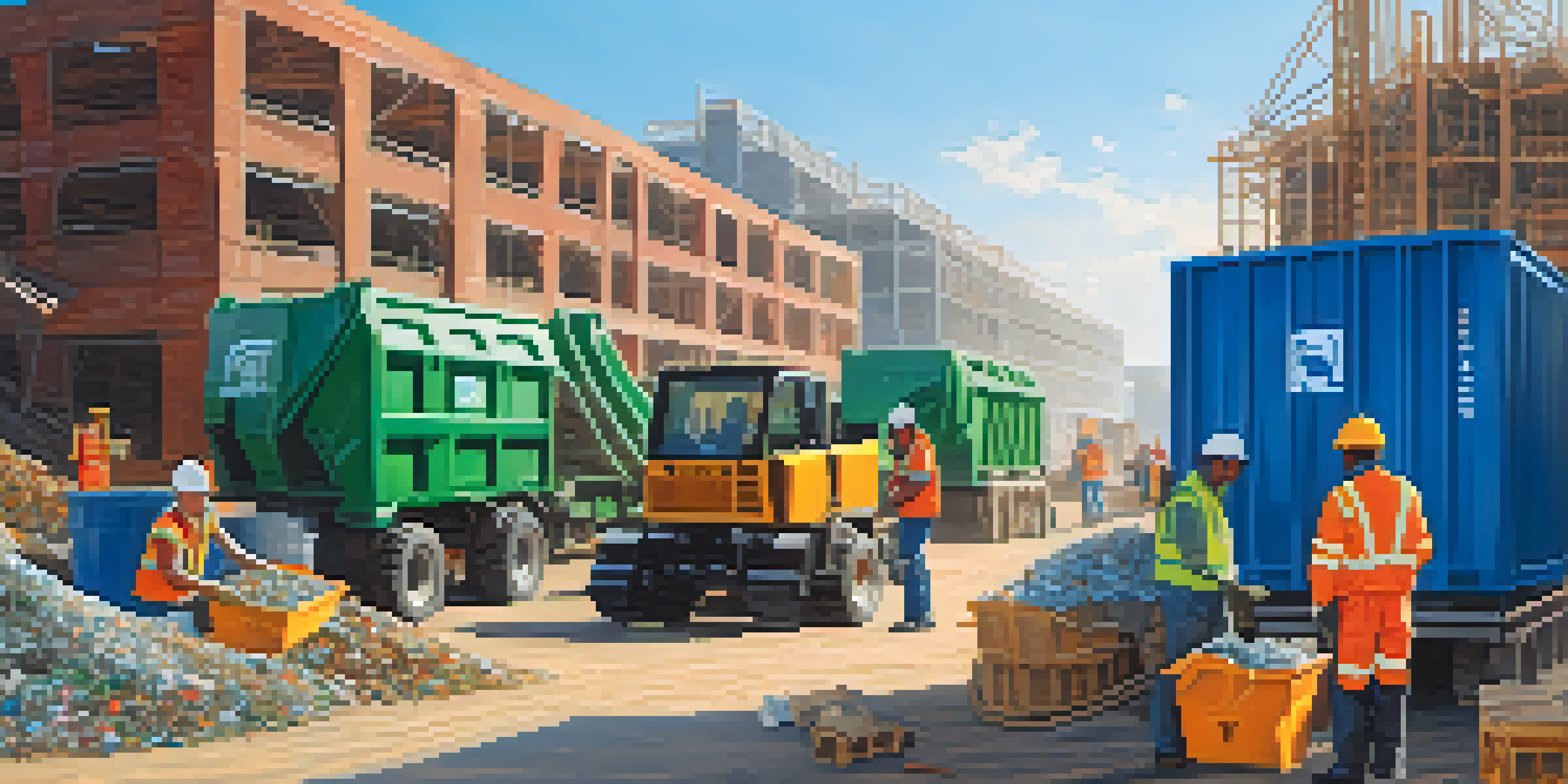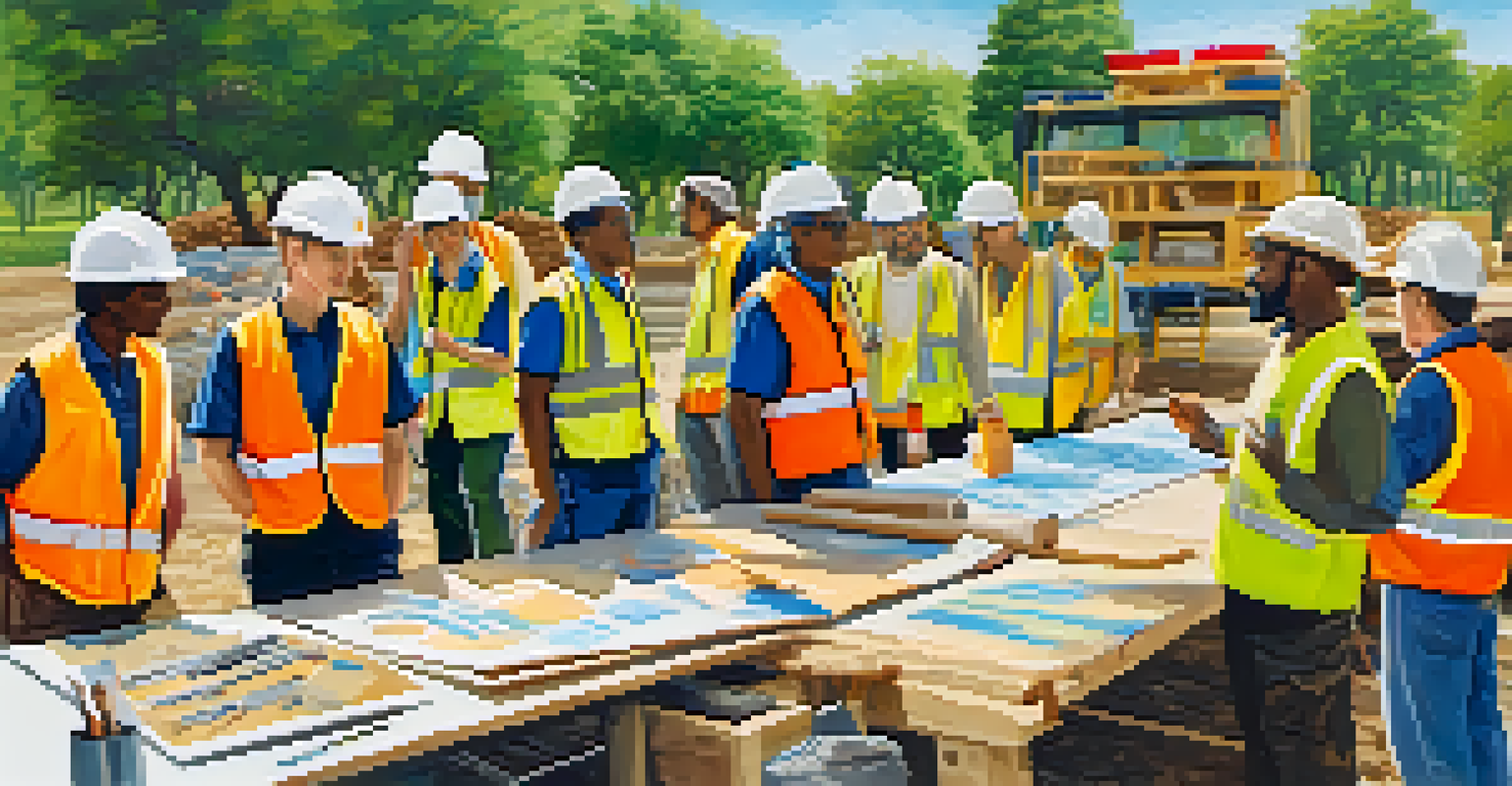Implementing Sustainable Waste Management in Construction

Understanding Sustainable Waste Management in Construction
Sustainable waste management in construction refers to practices that minimize waste generation and promote recycling and reuse. It’s about being mindful of the materials we use and how they impact the environment. For example, using recycled steel instead of new steel can significantly reduce waste and energy usage.
The greatest threat to our planet is the belief that someone else will save it.
This approach not only helps in conserving resources but also reduces the carbon footprint of construction projects. By focusing on sustainability from the outset, builders can create structures that are both environmentally friendly and economically viable. It's like planting seeds for a greener future, ensuring that our actions today benefit generations to come.
Ultimately, understanding the principles of sustainable waste management sets the foundation for integrating these practices into construction projects. It encourages stakeholders to think critically about how they approach waste and resource management, paving the way for innovative solutions.
The Importance of Waste Reduction in Construction
Reducing waste in construction is crucial not only for environmental reasons but also for cost savings. Construction sites are notorious for producing large amounts of waste, which can inflate budgets and extend timelines. By implementing waste reduction strategies, companies can streamline processes and save money while protecting the planet.

For instance, careful project planning and accurate measurements can help avoid over-ordering materials. Additionally, engaging with suppliers who prioritize sustainable practices can lead to more responsible sourcing of materials. It's like packing a suitcase: the more efficiently you pack, the less clutter you have to deal with later.
Waste Reduction Saves Money
Implementing waste reduction strategies not only benefits the environment but also leads to significant cost savings for construction companies.
Moreover, waste reduction fosters a culture of responsibility among construction teams. When workers are trained to prioritize waste management, it creates a collective mindset that values sustainable practices, ultimately leading to better project outcomes.
Strategies for Effective Waste Management in Construction
There are several effective strategies for implementing sustainable waste management in construction projects. One of the most impactful is the 3Rs approach: Reduce, Reuse, and Recycle. By prioritizing these principles, construction teams can significantly cut down on the amount of waste sent to landfills.
Sustainability is not about how much we can extract from the Earth, but how much we can leave for future generations.
For example, salvaging materials from demolition can provide valuable resources for new projects, thereby reducing the need for new materials. Additionally, recycling concrete and metals can create new products that are just as strong and durable as their virgin counterparts. It’s like giving materials a second life, making sure nothing goes to waste.
Implementing a waste management plan at the beginning of a project can also set clear guidelines for how waste will be handled. This proactive approach ensures that all team members understand their roles in minimizing waste, creating a more efficient and sustainable construction process.
Incorporating Technology in Waste Management
Technology plays a significant role in enhancing waste management practices in the construction industry. From software that tracks materials to apps that facilitate recycling, technology can optimize waste reduction efforts. For example, Building Information Modeling (BIM) can help construction teams visualize and plan projects more effectively, reducing waste from the start.
Additionally, mobile apps allow workers to report waste generation in real-time, making it easier to track and manage waste throughout the project lifecycle. This level of transparency can lead to more informed decision-making and quicker responses to potential waste issues. Think of it as having a GPS for waste management—it guides you to your destination with minimal detours.
Technology Enhances Sustainability
Utilizing technology like Building Information Modeling (BIM) can optimize material management and reduce waste from the outset of construction projects.
By embracing these technological advancements, construction companies can streamline their processes and improve sustainability. The right tools not only facilitate waste management but also foster a culture of innovation and responsibility within the industry.
Engaging Stakeholders in Sustainable Practices
Engaging stakeholders is essential for the success of sustainable waste management in construction. This includes everyone from project managers to subcontractors and even clients. When all parties are aligned on sustainability goals, it creates a unified approach to managing waste effectively.
For instance, holding workshops or training sessions on sustainable practices can empower workers to contribute to waste reduction efforts. By showing them the benefits and importance of these practices, companies can foster a sense of ownership and responsibility. It’s similar to a team sport; when everyone knows the game plan, the chances of success increase.
Moreover, involving clients in the decision-making process can lead to more sustainable choices in materials and methods. Their commitment to sustainability can drive project outcomes, ensuring that everyone is on the same page and working towards a common goal.
Measuring Success in Waste Management Efforts
To truly understand the impact of sustainable waste management in construction, it’s important to measure success. This can be done through various metrics, such as the amount of waste diverted from landfills or the percentage of materials reused. Establishing key performance indicators (KPIs) allows construction teams to track their progress over time.
For example, a construction project that successfully diverts 80% of its waste from landfills is demonstrating a commitment to sustainability. Regularly monitoring these metrics not only highlights successes but also identifies areas for improvement. It’s like checking your fitness progress; it keeps you motivated and focused on your goals.
Stakeholder Engagement is Key
Involving all stakeholders in sustainability efforts fosters a unified approach to waste management, leading to more effective and responsible practices.
Additionally, sharing these results with stakeholders can enhance transparency and accountability. When everyone sees the tangible benefits of waste management efforts, it reinforces the importance of sustainability within the construction industry.
Overcoming Challenges in Sustainable Waste Management
While the benefits of sustainable waste management are clear, there are challenges that construction companies must overcome. One common barrier is the initial cost of implementing sustainable practices. Many companies worry that investing in recycling programs or new technologies may not yield immediate returns.
However, it’s important to view these costs as long-term investments. Over time, the savings from reduced waste disposal fees and more efficient operations can far outweigh the initial expenses. It’s like investing in a quality pair of shoes; they may cost more upfront, but the durability and comfort pay off in the long run.

Additionally, changing the mindset of workers and stakeholders can be a hurdle. Education and training are key to overcoming resistance to change. By fostering a culture that values sustainability, companies can gradually shift perspectives and encourage everyone to embrace sustainable waste management practices.